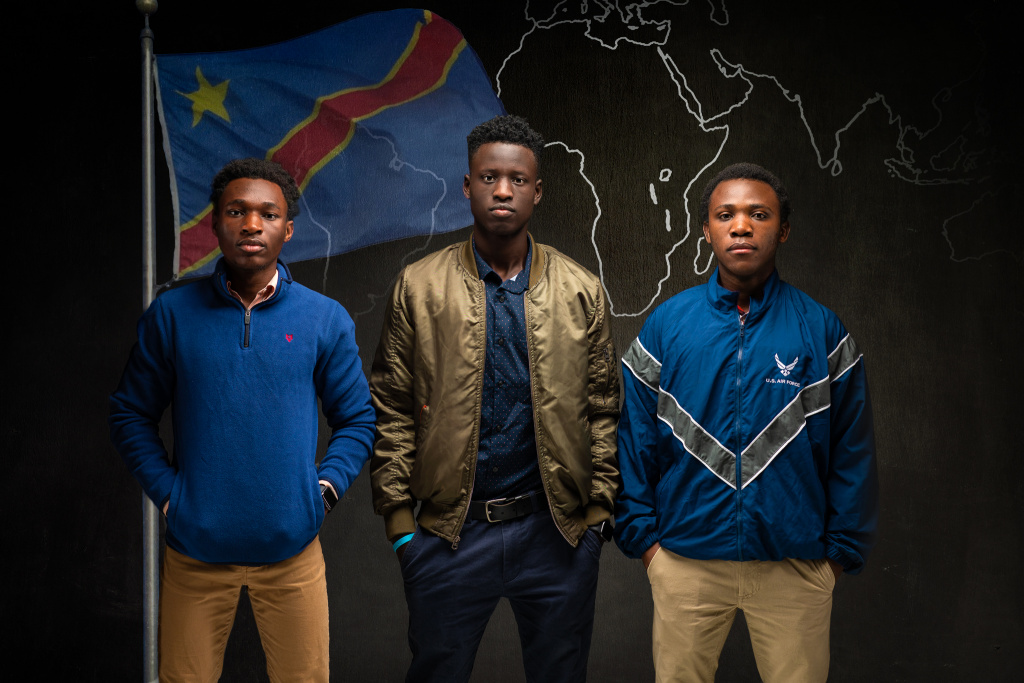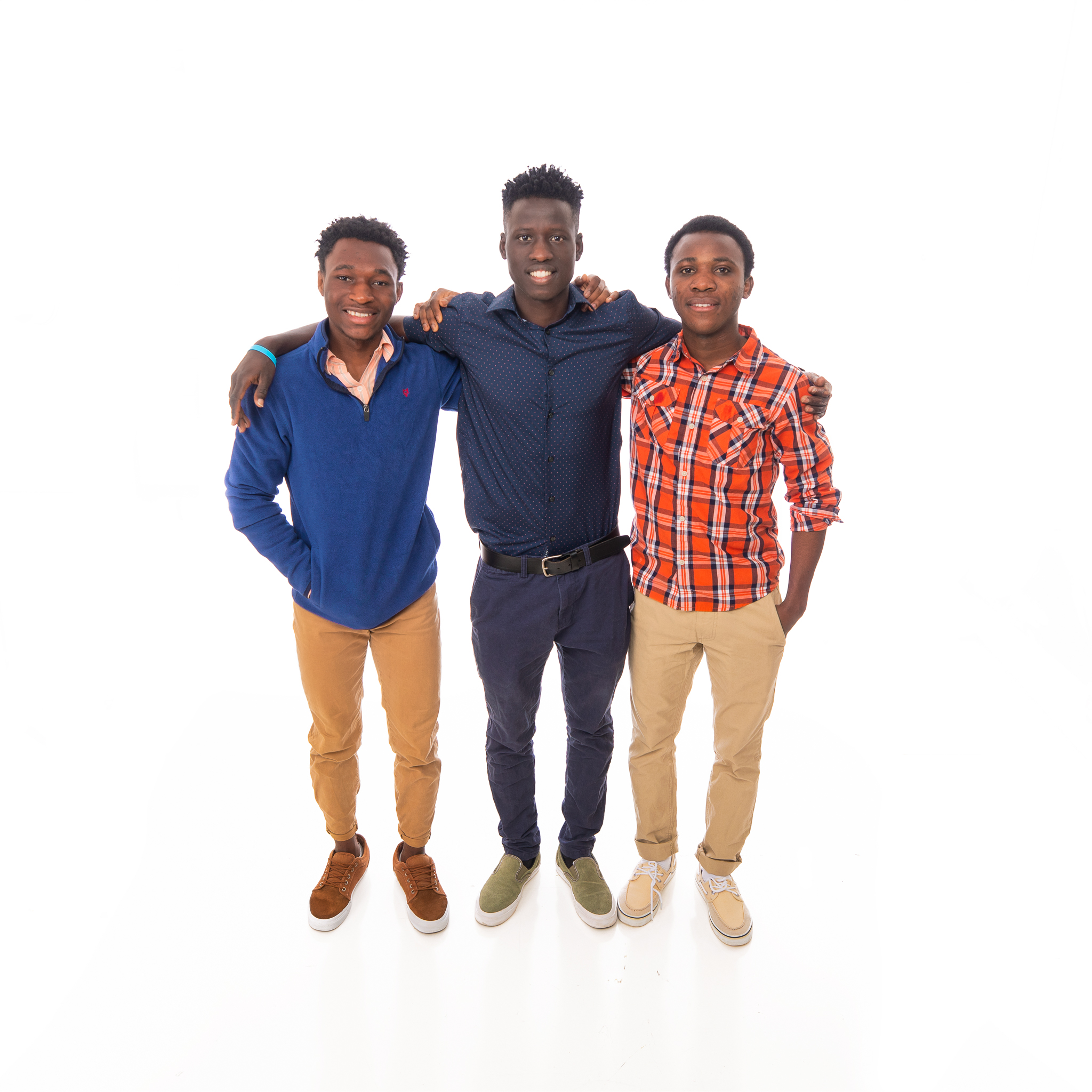A pregnant mother flees her home with her 5-year-old son and 3-year-old daughter in tow. The violence that had broken out elsewhere in the country has now spread to her village. Her husband isn’t at home. Is he safe? She prays he is. Her son runs faster and becomes part of another group. He doesn’t see his mother beaten and knocked unconscious or his sister killed.
This is the story of Pierre Nepa, the unborn child in the story, and his family. The families of Hodari Twishime and Zawadi Kashindi, fellow BJU freshmen, have similar stories. All three are the children of resettled refugees from the Democratic Republic of the Congo.
Life in the Camps
Before the civil war began, the families of Nepa, Twishime and Kashindi led quiet lives. They grew corn and sweet potatoes. Nepa’s father was a college prefect. Twishime’s father, however, was in the military and was involved in the fighting and sent to Rwanda before the family fled.
The DRC had seen sporadic bursts of violence since colonization, but civil war officially erupted in 1996 and has continued to this day. As the conflict spread, the three families fled. Nepa’s family found sanctuary — and was reunited — in a refugee camp in Tanzania, as did Kashindi’s. Twishime’s family followed his father to Rwanda.
All three young men were born in the refugee camps. “We were born there, and we grew up there,” said Twishime. Though the three lived in different camps and had different routines, their childhoods were similar. They told of finishing school then playing soccer, walking around the villages, and eating the forest fruit with their friends. Twishime said, “We (were) just having fun.”
Yet growing up in the camps wasn’t all fun and games. Reality set in that they were economically stuck. “We just kind of stay at the same level … still getting donations, still getting food, still getting this and that. We (were) just kind of controlled,” said Twishime.
When refugees arrive in another country, organizations such as UNHCR, the UN Refugee Agency, provide basic needs such as sanitation, water, shelter and sometimes food. The camps provide housing, employment and schooling since refugees may not work or attend school outside of the camp. Unfortunately, not many employment opportunities exist and the education system is subpar.
While refugees have many rights, they also have certain restrictions. “First, we cannot work in that country. You cannot have citizenship in that country. And you cannot go back in your country, like go back in Congo. If you go back, then you have to sign that you are going back in your country, you are no more a refugee,” said Nepa.
Coming to America and BJU
Refugee camps are intended to be temporary solutions. Those who flee their native countries have three options. They can voluntarily return to their home country after the conflict or persecution has ceased, resettle in a new country, or integrate into their host country. Most refugees become citizens of the communities they have fled to, and fewer than 1% are submitted by refugee agencies for resettlement.
Twishime’s family resettled in Columbia, South Carolina, in April 2016. Kashindi and his family followed in December 2016. Nepa’s family joined their neighborhood community in February 2019.
While Nepa had finished high school in Africa, Twishime and Kashindi finished at Columbia High School. While there, they played soccer for the school’s varsity team. The assistant coach had a former player who was then playing for the BJU Bruins soccer team and arranged for Twishime and Kashindi to meet Bruins head coach Matt Hotchkin.
Hotchkin invited the two to the soccer ID camp that summer. “We came. We enjoyed the campus. We enjoyed playing with the boys here. We felt like this is our place, you know. So, we tried our best to do whatever it takes to come here, and then God did it. We came here,” said Twishime.
Meanwhile, Nepa was taking classes at Midlands Technical College in Columbia. “I didn’t have any idea if I (could) come here,” he said. “I (did) not (think that) this kind of big college, big university can allow people with a GED to attend classes.” Nepa’s plan was to complete two years at a community college before transferring to a larger university.
Kashindi and Twishime wanted Nepa to join them at BJU and convinced him to at least talk to the admission counselor. He did and was excited to find that BJU accepts the GED. Kashindi and Twishime are now in their second semester at BJU, and Nepa is in his first. The three are roommates.
In addition to the strong academic and athletic programs, the young men are grateful for the biblical worldview at BJU. “Going to a Christian college was one of our dreams,” said Twishime. “You want to go to a Christian school so we can stay close to God. … So having Bob Jones as a Christian school is very amazing.”
Though the three face struggles that come from learning in a language that is not native to them, they have found the people at BJU to be helpful and friendly. “English is not our first language, but we still have the chance to meet other people and get help whenever we need it,” said Nepa.
Added Twishime: “Bob Jones’s people, either faculty, teachers, professors, students, coaches — they’re very, very helpful. Especially for us. They make sure we keep learning English.”
Looking to the Future
Nepa, Kashindi and Twishime are grateful for the opportunity they have been given. Said Twishime: “We thank God for everything. We thank the United States for giving us a new life. (We are) very thankful (to) Bob Jones University for the opportunity to study and grow academically, spiritually and professionally. (We give a) big thanks to coach Matt Hotchkin and coach Greg Fulton. Without both of them, we couldn’t be here.”
The three plan to pay forward what they have been given. “Our dream is just to go back and help (the people we left in Africa) out,” said Twishime.
Nepa is currently involved in the Air Force ROTC crosstown program at BJU to show his gratitude to the United States “for giving me a home that I did not have for many years.” He also plans to open a Christian high school in Africa that will work with American and European universities to provide quality education to refugee high school students. His goal is to help them grow academically and spiritually while connecting them with western universities. He wants to “give hope to other people who do not have hope and who are already desperate, by teaching them the Word of God.”
One of Nepa’s mentors from his church in Columbia had encouraged him to come to BJU because he thought Nepa would enjoy the Christian environment. “He was not wrong,” said Nepa, “because right now, I feel like I am where I (am) supposed to be, and where I can … achieve my dream.”
Kashindi, Twishime and Nepa are grateful to be in the U.S. and at BJU. “We feel like we’re home.”









